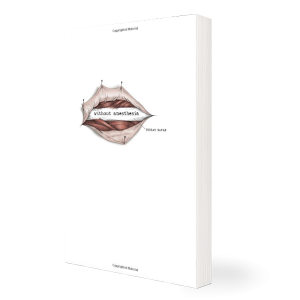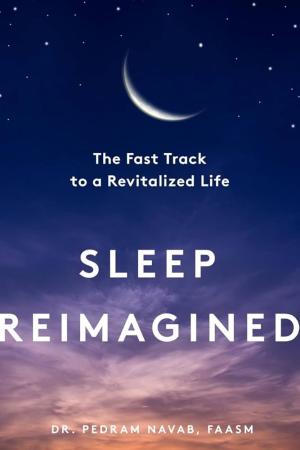
By Andrew Jimenez
It’s not uncommon for those living in the fast-paced world of their medical residency to go 24 to 30 hours without sleep as they tend to patients and file mountains of paperwork. UC Irvine English alumnus Pedram Navab endured what has become the grueling norm for those in residency, and more. During these days of sleep deprivation, Navab experienced a brush with death and penned the early works of his novelist career. Currently, Navab is a neurologist and sleep medicine specialist, a novelist and an attorney. And he credits much of his success to his beginnings as an English major.
The path unplanned
When Navab '94 (B.A. English) took his first steps onto the UC Irvine campus, a degree in English wasn’t in his plans. For the first 18 years of his life, Navab’s parents pushed him towards the sciences, and so when he applied for college, he did so as a biological sciences major, with a particular interest in medicine. As he took his courses, however, he felt dissatisfied. He struggled to connect as he sat in large lecture halls with other bio majors. Looking for a change, he enrolled in Humanities Core.
Navab found himself enraptured by Humanities Core’s topics of gender and racial identity, ideas not present during his attendance at a private Christian high school. “We read a lot of works like Hwang’s M. Butterfly that subvert gender roles. These texts proved very influential and stuck with me as I began my writing.” Influenced by the conversations in Humanities Core, Navab pursued a study abroad program in Leeds, England, where he studied at the University of Leeds. Upon returning to UCI, he sat in on a critical theory course taught by the famous French philosopher Jacques Derrida. From that point on, Navab was hooked. “While listening to Derrida, I realized I had to be an English major with an emphasis in critical theory. So I switched my major to English and spent the next two years in the Humanities Honors Program, where the classes were far smaller and more personal.” Thanks to the immeasurable support of his honors thesis advisor, Rey Chow (now an Andrew W. Mellon distinguished professor in the humanities at Duke University), Navab then pursued graduate study in English and Modern Culture & Media at Brown University.
Altered perspective
Navab decided to shift his career path after his graduate school experience; while he had loved staff in the humanities at UCI, he didn’t find the same fulfillment while attending Brown University. Navab hadn’t lost his passion for medicine, though. He successfully applied to medical school, and influenced by his time studying humanities and fascinated by the human mind, pursued neurology for his medical residency. Navab shares, “What I like about medicine is its perpetual stories. In some ways, it’s no different than studying English. Every day, you’re immersed in different people’s lives, and many of them could be their own book.”
It was during his residency that Navab first dealt with the existential issues surrounding death. While he was on call, he had the responsibility of pronouncing a fellow physician, who was involved in what would be a fatal motorcycle accident, dead. In the moment, he struggled to “grapple with all of these big issues. How do we tell a loved one that their partner is dead? And what that means!” Wrestling with these complex feelings, he turned to writing, using it to find solace in these moments of extreme challenge.
Life through literature

It was through studying English at UCI that he learned to understand others. Navab turned to writing during his residency, however, as a way to process his own feelings as he helped patients through sickness, recovery, tragedy and even death. His experience dealing with his first cadaver was the emotional point that brought him to write his first novel, Without Anesthesia (Jaded Ibiss Press, 2014). The story interweaves various storylines and characters, such as a cadaver whose body becomes the site for revelatory change and a medical student whose compulsive desire to feel her patients’ pain leads her to destroy her own body by methods both creative and horrific.

While Navab wrote his first novel in response to working around death, his second novel, This Will Destroy You (Spuyten Duyvil Publishing, 2019), was born from his own encounter with it. During Navab’s residency, he took a trip home, driving from Arizona back to California overnight. He was exhausted from the long hours at work and kept dozing into microsleeps despite his best efforts to stay awake. Slipping into a full sleep, he crashed his car off the side of the road, knocking himself unconscious; it would be hours before a helicopter arrived at the scene to transport him to the hospital. He was seriously injured in the crash, spent several weeks in the hospital and, ultimately, had to undergo a craniotomy to stop the bleeding in his head.
Not sleeping on the future
Navab reflected on his accident, and how he had become so used to the sleepless days at his residency that his brain had been wired to forget the severe consequences of trying to survive with such little sleep. He looked around and witnessed a society where many of its most essential jobs required employees to work long days with very little sleep. With a mission to educate as many people as possible, Navab decided to become a sleep medicine specialist. He completed a fellowship at the Stanford University School of Medicine (2005-2006) and then obtained his Juris Doctor (JD) degree at Loyola Law School, specializing in health law and intellectual property.

Navab hasn’t stopped advocating for sleep rights since. He has advocated at Capitol Hill for a bill to eliminate seasonal time changes in favor of permanent standard time (ST) and has worked with truck drivers and pilots to ensure they get the sleep needed to continue their jobs. He’s also continued his writing career, publishing Sleep Reimagined: The Fast Track to a Revitalized Life (W.W. Norton & Company, 2022). Navab believes that the best way to inform people is to share real stories that help demonstrate how others have experienced similar issues. Now, he is a consultant at The Hoag Sleep Center in Newport Beach, California, where he helps hundreds of patients with insomnia (though somehow manages to squeeze in time to work on his next novel and attend interviews).
With such a long list of accomplishments, it seems unrealistic to imagine that Dr. Navab would get any sleep himself. Navab advised that to accomplish so much and find those all-important hours to sleep is “time management; I tell myself I’ve got an hour to do this interview. Everything is compartmentalized. Otherwise, I couldn’t function; you also need time to enjoy yourself. It’s just about how you manage your time.”
About Andrew Jimenez
Andrew Jimenez is a freelance writer and aspiring journalist. He wishes to use his lifelong passion for writing and research to inspire and inform others through his works. Jimenez graduated from UCI in 2024 with a B.A. in History.
Interested in reading more from the School of Humanities? Sign up for our monthly newsletter.
Learn more about Dr. Navab’s recent book here: Pedram Navab | W. W. Norton & Company
